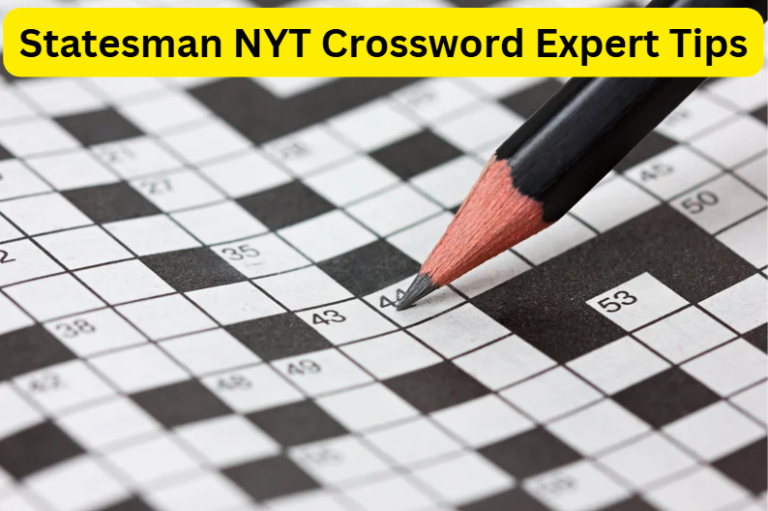If you’ve ever found yourself staring at a blank grid while attempting the Statesman Nyt Crossword, you know that some clues can feel like they were crafted in another language. One clue that often pops up is “statesman.” But fear not! With the right strategies and tools, cracking these puzzles becomes an exciting challenge rather than a daunting task. Whether you’re a novice or looking to sharpen your skills, we’ve got tips to help you tackle those tricky clues with confidence. Let’s dive into the world of crosswords and transform your puzzling experience from frustrating to fun!
Understanding the Format of NYT Crossword
The New York Times Crossword has a distinctive format that sets it apart from other puzzles. Typically, the grid consists of 15 rows and 15 columns for the weekday editions, while the Sunday version is larger at 21 by 21 squares.
Black squares break up white ones, guiding your path through clues. The numbers in the grid correspond to specific clues listed outside it—this is where you begin your journey.
Across and down are indicated clearly, helping you navigate which direction to fill in letters. Pay attention to theme-based puzzles; they often feature clever wordplay or hidden connections among answers.
Understanding these elements gives you an edge right off the bat. Familiarizing yourself with this layout will help reduce any initial confusion when facing those enticing yet perplexing clues like “statesman.”
Tips for Solving the Clues
When tackling clues in the NYT Crossword, start by reading them carefully and considering all possible meanings. Many clues are clever wordplay or puns. Keeping an open mind can lead to those “aha” moments.
Look for context within the surrounding answers. Sometimes a single letter can unlock multiple possibilities. Don’t hesitate to fill in what you know first; this often creates a framework for solving trickier parts.
If you’re stuck, skip ahead to another section of the puzzle and return later. Fresh eyes can make a big difference after taking a break.
Additionally, think about common themes or topics that frequently appear in crosswords—historical figures, pop culture references, geography. This knowledge will expand your solving toolkit significantly as you encounter more puzzles over time.
Common Abbreviations and Tricks to Look Out For
When tackling the “statesman” clue in a NYT crossword, knowing common abbreviations can be a game changer. Look for shortened terms like “Sen.” for senator or “Gov.” for governor. These are frequently used and can narrow down your choices significantly.
Another trick is to consider historical figures. If you see a clue with time-related hints, think of influential statesmen from that era. Names like Churchill or Lincoln often pop up.
Familiarize yourself with geographical abbreviations too. For example, state postal codes may hint at locations tied to political history.
Don’t forget about wordplay; clues may twist meanings unexpectedly. The answer might not only focus on politicians but could also reference their roles or significant legislation they championed.
Keep an eye out for puns—crosswords love clever twists! Being open-minded will enhance your solving experience immensely.
Resources for Beginners
If you’re new to the world of crosswords, there are plenty of resources at your fingertips. Online platforms like Crossword Puzzle Solver offer guidance for tough clues, including “statesman nyt crossword.”
Mobile apps designed specifically for beginners can help familiarize you with common terms and formats. Look out for features that explain answers or provide hints based on difficulty levels.
Books focused on crossword puzzles often contain beginner-friendly sections. Try to find ones that highlight strategies rather than just solutions.
Joining online forums or social media groups dedicated to crossword enthusiasts can also be a game changer. Engaging with experienced solvers allows you to share tips and learn from their approaches firsthand.
Check local libraries for puzzle books tailored to all skill levels; they might even host community events where you can practice solving together.
Practice Makes Perfect: How to Improve Your Crossword Skills
Improving your crossword skills takes time and dedication. Start by consistently solving puzzles from various sources. The New York Times offers different difficulty levels, so you can gradually build your expertise.
Engage with friends or join online communities focused on crosswords. Sharing tips and strategies can lead to new insights that enhance your problem-solving abilities.
Set aside regular practice sessions each week. Treat them as a fun workout for your brain. Over time, you’ll start recognizing patterns in clues and answers more easily.
Don’t shy away from mistakes; they’re part of the learning process. Analyze incorrect guesses to understand what led you astray.
Consider using apps designed for crosswords, which often have built-in hints or explain common themes found in puzzles. This interactive approach makes learning enjoyable while sharpening your skills effectively.
The Mental Benefits of Solving Crosswords
Engaging with crosswords offers a workout for the brain. Each clue challenges memory, vocabulary, and reasoning skills. This mental exercise can enhance cognitive function over time.
As you navigate clues like “statesman NYT crossword,” you sharpen your problem-solving abilities. Deciphering hints requires quick thinking and adaptability, fostering a flexible mindset.
Additionally, solving puzzles boosts concentration and focus. As distractions abound in daily life, dedicating time to crosswords trains your mind to zero in on specific tasks.
Regularly tackling these puzzles may also reduce the risk of cognitive decline as you age. Keeping your brain active encourages neural connections that support long-term mental health.
Moreover, there’s satisfaction in completing a puzzle—a rewarding experience that fosters confidence and perseverance. Embracing this challenge cultivates resilience while providing enjoyment along the way.
Conclusion
The New York Times crossword puzzle is more than just a pastime; it’s an intellectual exercise that many look forward to each week. Among its myriad clues, “statesman” often appears, inviting solvers to tap into their knowledge of history and politics. Understanding how to approach this clue can enhance your crossword-solving experience.
Knowing how the NYT crossword is structured will help you navigate its complexities. The grid consists of black and white squares where answers interlock with one another. Each clue correlates with either an across or down answer, and they can vary in difficulty from simple definitions to obscure references. Familiarizing yourself with common formats helps set expectations before diving in.
When tackling clues like “statesman,” context matters greatly. Think about prominent figures who fit both historical significance and letter count indicated by the boxes available. Look for famous politicians or diplomats who have made notable impacts on society—these are often prime candidates for such clues.
Crossword puzzles frequently employ abbreviations that may trip up new solvers if not recognized quickly. For example, “Sen.” refers to senator while “Rep.” denotes representative—a helpful shortcut when contemplating political figures as potential answers for “statesman.” Additionally, keep an eye out for puns or wordplay; cleverness abounds within these grids!
If you’re new to crosswords, several resources are at your disposal! Online communities offer guidance through forums dedicated solely to puzzlers sharing tips and tricks—like Reddit’s r/crosswords subreddit—or even apps designed specifically for beginners looking to build skills gradually over time.
Practice builds confidence! Try solving easier puzzles first before progressing onto advanced ones laden with traps designed by seasoned constructors. Consistent practice aids familiarity not only with vocabulary but also pattern recognition which proves invaluable when approaching any tricky state-related keywords like “statesman.”
Engaging regularly in crossword activities offers cognitive benefits too! Research points toward improved memory retention alongside enhanced problem-solving abilities when participating

